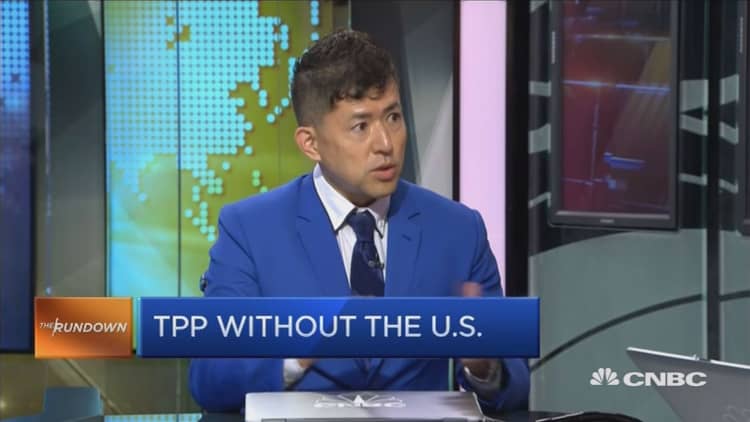
Japan was expecting the U.S. to return to the Trans-Pacific Partnership (TPP) fold and was only "pretending" to negotiate a bilateral deal, Kotaro Tamura, a Milken Institute Asia Fellow, told CNBC on Tuesday.
"Japan's prime minister and government paid a tremendous amount of political capital to make [the TPP] happen. They won't waste it," said Tamura, who was a Japanese senator from Prime Minister Shinzo Abe's Liberal Democratic Party (LDP) from 2002-2010.
"Of course they were pretending to talk about a free trade agreement (FTA), but bottom in the heart, they will be welcoming the U.S. back," he told CNBC's "The Rundown" on Tuesday. "It's not about FTA. It's buying time, but in reality, they are looking for the U.S. coming back to the pact."
Abe reiterated in an interview with CNBC on Monday that Japan would continue to push for an ex-U.S. TPP deal.
U.S. President Donald Trump pulled the U.S. out of the TPP, a broad 12-nation trade deal, which he claimed was a "disaster" that would hurt U.S. manufacturing.
Japan's prime minister had initially said that the TPP would be "meaningless" without the U.S., but more recently, Japanese officials have seconded Australia's calls for the other 11 members of the pact to proceed without the U.S.
Trump has expressed a preference for bilateral trade agreements, over multi-lateral ones, claiming he can negotiate better deals that way.
But Tamura, noting that he'd been in California as Japanese government officials met with business and U.S. officials, told CNBC that he believed both Prime Minister Abe and Deputy Prime Minister Taro Aso appeared confident the U.S. would eventually rejoin TPP.
"They seem very confident. Otherwise, Japan would not do something like that without the U.S. moving ahead with other 10 membership countries," he said.
Trump's decision to walk away from TPP damaged at least some of Abe's structural reform drives.
For example, Abe's administration managed to push through some liberalizing measures for the tightly controlled agriculture sector, with the promise of more to come to comply with TPP, in part by dangling the prospect of access to large export markets such as the U.S.
Reforming the agriculture sector has long been politically unpalatable in Japan, even though it's widely believed to be necessary in a country where food prices are considered relatively high because of the segment's inefficiencies.
That could be one reason Japan got on the TPP-11 bandwagon.


